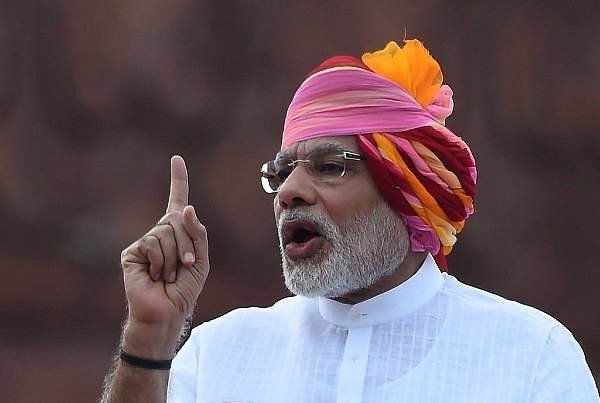
Balochistan: Prime Minister Modi’s Masterstroke
Prime Minister Modi’s act of bringing up Balochistan in his Independence Day speech 2016 was a masterstroke.
It hit three birds with a strike, namely, Pakistan, the Indian National Congress and the left-liberal intelligentsia.
Prime Minister Narendra Modi has hit three birds with a single strike by uttering the “B” word in the same breath as Pakistan-occupied Kashmir (PoK).
The first one is, of course, Pakistan itself. For a State that would face an existential crisis if it tones down its anti-India rhetoric, Balochistan is the issue which would have hurt it the most. The record of atrocities, rapes and murders of the civilian population in Balochistan by two principal State actors in Pakistan, namely Inter-Services Intelligence (ISI) and Pakistan military, is well documented. What is important to emphasise, though, is an unchallenged submission by the democratically elected Nawaz Sharif government to the ISI and military for the sake of its own existence, and their joint mission to escalate cross-border infiltration and active material support to anti-India elements in Jammu and Kashmir (J&K). In the process, they presume that they can divert global attention from what is going on in their own backyard.
The second strike is the principal opposition party, Indian National Congress (INC). On the issue of Balochistan, Congress is already on a sticky wicket due to its historical baggage of the Sharm-el-Sheikh joint statement of then Indian Prime Minister Dr Manmohan Singh and Pakistani Prime Minister Yousuf Raza Gilani. With the PoK-Balochistan issue and the FIR against Amnesty International India under sedition law by its own state government in Karnataka, Congress is in total disarray.
These days, it seems like the main role of the Congress spokesperson Randeep Singh Surjewala is not to attack the government or the BJP but to distance his party from the statements of the likes of Digvijaya Singh, Salman Khurshid, Chidambaram and Kapil Sibal. During the UPA regime, the same coterie put forward the “zero loss theory” in the 2G scam, accused the Rashtriya Swayamsevak Sangh (RSS) of the 29/11 Mumbai attacks and criticised security forces for the Batla House encounter of the hiding militants. Today, the history is repeating itself. The number of voices within the Congress on these issues exceeds the total number spokespersons in Congress. Yet, no one knows what the official stand of the Congress is.
One example will suffice to explain the extent of disarray within the Congress party. When Surjewala distanced the Congress from Khurshid’s statement, the next day Khurshid said, “But that’s not the party line. I am a senior spokesperson till I am sacked from the Congress. And I am saying that is not the party line.” But one should understand the pain of Khurshid. All his co-members of the UPA “think tank,” namely, Sibal, Chidambaram, Jairam Ramesh and Digvijaya Singh, have Rajya Sabha seats but not him.
The third strike is left-liberal intelligentsia. There are three main arguments for their opposition to the utterance of the “B” word. First, they think that it will encourage Pakistan to talk about Kashmir. They also argue that Pakistan (and other countries) would raise the level of unrest in other parts of the country, like the North East. Both these arguments presume incorrectly that if we don’t utter the “B” word, these forces will stop talking about Kashmir and the North East.
The next argument is that there is a lack of support for these issues from the “international community” (which means the US and the NATO countries). However, the latest statement of the official spokesman of the US State Department, Mark Toner, in which he says that the US is concerned about the human rights situation in PoK and Balochistan debunks this apprehension.
Similarly, theorists who take the ‘high moral ground’ need to understand that moral ground cannot be a cover for our vagueness and weakness. Our moral ground will be respected only if we are talking from a position of strength.